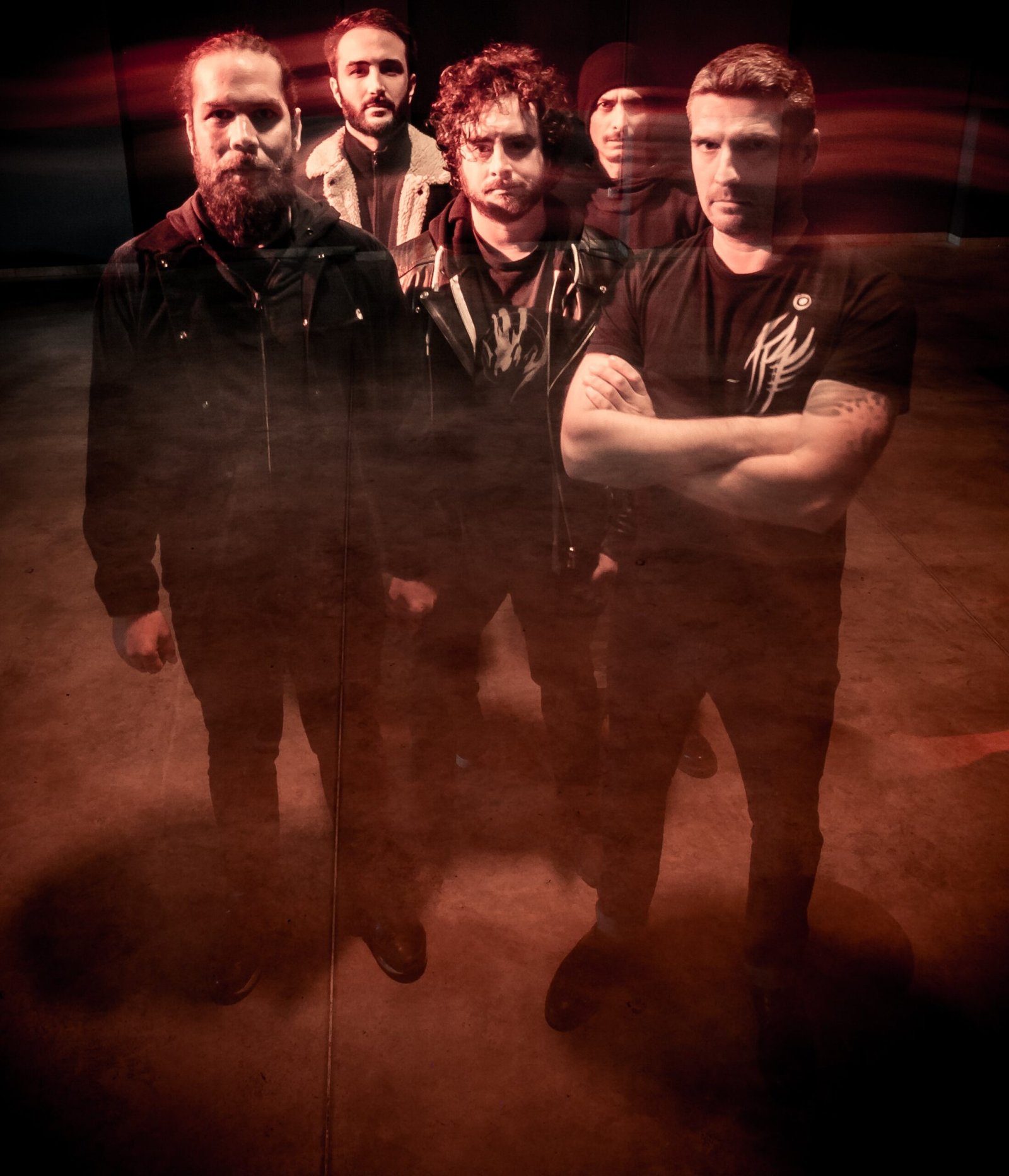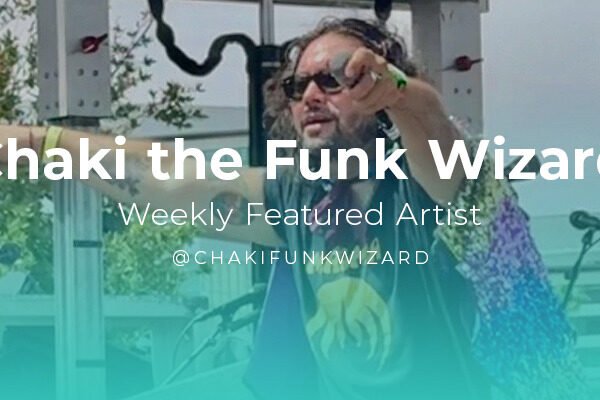Having been friends for over two decades and forming the band a few years ago out of a mutual curiosity for what they’d create, the five members of Ahasver have made a good fist of their debut album. Causa Sui was released in September this year, and has launched itself straight to the top of my personal top albums of 2022 list. Imagine my delight when I heard the band had read my review, and found it ‘deeply moving’ – just the way I felt about their album. Finding great new music in the sea of static that is independent releases, not to mention the onslaught of new material established bands are churning out that feels like one should listen to it just to avoid FOMO, is a challenge to say the least, and yet, every once in a while, there’s a speck of real gold in amongst the sand. Causa Sui was this speck of gold for me.
Something about Causa Sui feels important, poignant. I couldn’t stop thinking about the album for days after I first heard it, it was like I needed to hear it again. Of course, I listened to it to review it, but more often than not, I found myself listening, transfixed, as I grappled to find the words to describe what I was hearing and feeling, and then giving up on words altogether and just sitting in the experience. Normally, I like to write reviews while I’m listening to the album, but I just couldn’t do that with Causa Sui – it was too overwhelming, too demanding of my full attention, too laden with emotion and myth and visceral energy to be background music. Upon hearing that Ahasver had not only read my review, but thought it was touching enough to reach out to EIN, I knew one thing: I needed an interview, I needed insight. Guitarist and vocalist Mickaël André indulged me, and so I began to delve deeper into Causa Sui and the story of Ahasver.
The band formed in the same way many bands do – the members had been friends for years, and most had played together before. Not infrequently, they’d all gather ‘drinking beers, debating about music or guitar sounds’ – from my own experience, the best basis for forming a band. When drummer Théo Astorga’s band Dimitree split, it made sense to create something new – what exactly, they weren’t sure, but they knew they wanted it to be some form of ‘extreme’ metal. André, Astorga, and second guitarist/vocalist Julien Deyres had all played together in Zubrowska a decade earlier, ‘so it was easy for us to gather again and see what would pop up in rehearsal’. First and foremost, they all wanted to ‘put our desires in common’ and find out what happened, without worrying too much about the style. What they ended up creating is the most tantalisingly multi-faceted culmination of all things metal I’ve ever heard.
André named a few bands that had influenced the members of Ahasver when they were younger, but he believes (and I agree) that there is so little left in Ahasver’s sound from these bands that there’s no need to list them. I personally had a lot of fun trying to guess the band’s influences as I was listening to the album – my money was on Machine Head, The Dillinger Escape Plan, Gojira, and Mastodon; interestingly, none of these were mentioned by André. As he puts it:
‘We are around our forties now and even if it can sound a bit pretentious, we spent enough time writing and recording music to count more on ourselves than on our influences to write songs… I think we are most influenced by what we want to feel while we play and record, it’s more about a search to connect with our inner deep. We know the tools now, and how to use them. It can be a blast beat, a particular melody, harmony or a guitar pedal, it’s more about looking for what we want to express and then use the right tool to reach it.’
Strongly influenced by old writings, astrophysics, and myths, Ahasver have turned not just the album, but their entire existence as a band into a concept. Founded on the biblical story of Ahasverus, who cursed Jesus on his way to Golgotha and was therefore condemned to walk the earth incessantly until the Second Coming, Ahasver tell the story of his travels and struggles through Causa Sui. Despite this story being widespread since the 13th Century, details seem blurry and inconsistent across versions, with accounts disagreeing on who exactly Ahasverus was, when the encounter with Jesus occurred, and what he experienced during his condemnation – fertile grounds for interpretation and creative license.
During the writing process of Causa Sui, vocalist Nico Bastide ‘imagined different states and events the character of Ahasver could have been through, and developed it as a giant metaphor of mankind’s universal journey on earth, something that can be felt by everyone’. To the band, the story of Ahasverus is about ‘what every human should be able to experience in life, in its strongest form, from hate to love and despair to joy, with everything in between’, and brings up ‘a lot of very universal human questions’. With all the members of the band being passionate about art that moves one to tears, be it of pain or joy, this concept offered a ‘wide spectrum’ of emotion and imagery to work with.
André elaborates:
‘When we write songs, we often speak about colors, textures and feelings, so it’s always about images and moods, very much about feeling what the songs are about. Personally, I’m always about creating something that resonates with an interior state, whether it be in creating music, painting, photography or whatever I try to produce, and I think it’s the same for Nico [Astorga] and the lyrics, we absolutely have to connect with what we are doing, because we can’t fake it. It’s something we often speak about… we want to be aware of our state of minds and heart, it’s a permanent quest for learning about ourselves.’
This is also reflected in the album’s cover art, which features an ambiguous human-shaped cloak, a clean black and cream colour palette, and deliberate, crisp lines. For the band, this was a step away from their usual preference for ‘textured, dense and dirty things’ – in an attempt to expand themselves and encompass the varying emotions represented on Causa Sui, Ahasver decided to flip their preference around and go for something ‘very clinical, very purified’. While the band like to keep their listeners curious about what the album cover means, André nonetheless hints that ‘the path of Ahasver and the universality of the feelings described on the album could well echo the possibilities hidden under this drape’. He muses further: ‘The idea of representing something without showing it allows us to leave the story open, as we took Ahasver’s myth to added our own interpretation. We wanted the cover to invite people to question the possibilities of things to exist or not, and also starting from what’.
The writing and recording processes for Causa Sui were deeply linked, with the band originally writing to pre-programmed drum loops, recording bass and vocals on top of these, and thus creating the songs “Peace” and “Fierce”. These songs were then brought into rehearsals and workshopped to give a more live feeling. With bassist Victor Minois joining the band after the departure of the original bassist, Ahasver also inadvertently gained a recording engineer and producer – Minois felt more and more that he wanted to record the album. ‘The more we were progressing in the writing process, the more he [Minois] felt he wanted to record the album. This was also a good way for us to keep the whole process within our circle, meaning that we would be able to craft things more precisely’, André explains. Right near the start of the recording process, Covid struck, separating the band for almost a year.
While this may sound frustrating and inhibiting, and was exactly that for many bands, Ahasver made light of the situation, seeing it as an opportunity to ‘really take time to refine even more the takes for the album’. The instruments were recorded separately, a challenge, as André recalls: ‘I remember some hard times confronting our desire for something more natural and raw than what Victor [Minois] was aiming for, especially speaking of instrumental technique’. This balance between technical challenge and live energy was a point of tension throughout the writing process, too, with some band members being after a personal challenge on their instruments, while others were ‘more focusing on emotion and spontaneity’.
Like many bands that write songs as they’re programming/recording them, or vice versa, Ahasver then struck the need to learn the songs once they were fully composed. As a result, some songs changed after they’d been written, especially “Wrath” – André remembers that this one ‘took some time to tame’. He was sceptical of their ability to play the fast blast-beat intro live, while other members of the band had no such qualms. Even now, André feels the song ‘keeps that strange feeling of sounding different from the beginning, it’s hard to explain’. Luckily, there is an ever-changing and thriving music scene in Ahasver’s home town of Toulouse, France, which has given them ample opportunities to road-test their songs.
On a personal level, André feels like he’s always been ’swimming against the tide’, though. While there are a wide variety of metal bands, he feels each is ‘dealing with their own business… this feeling is strongly reinforced by the fact that many of the bands I played in aren’t easily labeled or weren’t labeled the metal trend of the moment’. This sense of isolation is something André has had for the better part of 20 years, playing in a scene that helped him find some of the strongest relationships of his life, ‘despite that strange feeling of not being completely on the same page’. He attempts to explain this sensation.
‘The earliest I felt this was with Ethersens, an old band of mine which is dormant at the moment. We were playing proggy indie metal which was absolutely not present in Toulouse at that time, around 2008, and we struggled to find some form of understanding, because everybody was playing extreme stuff around us and melodic singing was clearly not the trend in France… without saying we were inventing anything, we felt quite isolated musically. Friendship has never been a problem but in terms of music, I feel these successive waving trends that we never get attached to, which is a strange sensation.
Same with the stoner or doom thing, that was the trend here a few years back and I feel the same with Ahasver now, everyone is playing black metal or post punk things these days, and I can clearly feel that it’s the actual trend. We have a lot of good friends playing these styles with good tastes and ambitious quality projects, and I still feel that sensation of being on my own with Ahasver. I also feel the same with Eryn Non Dae, this band has its small fan base, but only a few people here seem to get where we are going with this project.’
On future releases, Ahasver want to focus more on ‘trying to find a sort of alchemy in rehearsal again’, and are possibly aiming for a rawer sound – ‘Causa Sui was born from a lot of preproduction and arrangements written at home, in front of a computer and we would like to be able to gather in rehearsal to let things flows and happens again, with loudness, feedback, exchange and common energy’. In any case, the band are sure there will be another record, and talk about it often: ‘there is a lot to be done with our actual desires and tools’. André adds that ‘it won’t sound the same, I’m sure about that’. I asked him about his hopes for Ahasver’s future, and he replied: ‘If I was twenty, I would say, tour the world, sell millions of records and wait for James Hetfield to call us, but I’m not’ – it’s more a hope to carry on working on Ahasver’s music and expression, as well as playing live, and going back to the rehearsal space, ‘because in the end, what will stay is the music we created’.

Ahasver are…
Nicolas Bastide – Vocals
Mickaël André – Guitar, Vocals
Julien Deyres – Guitar, Vocals
Victor Minois – Bass
Théo Astorga – Drums
Causa Sui gripped me in a way nothing had for a long time, it left me stunned and speechless as it tunneled its way into every corner of my being, clinging to the corners of my mind for days after I heard it. I became borderline obsessed with it, because of its indefinable sound, the weight of it both sonically and lyrically, the sense of significance – and, not least, because the songs are quite simply killer. I believed it to be about human insignificance, first and foremost; but I’ve come to see it in a different light. Perhaps, on the whole, it is about that, but it’s also about the vividity of emotion, about the depth of life’s experiences. Spend some time with it yourself on Bandcamp, follow Ahasver on Facebook, or support the band by buying their merch. I’m excited to see where their journeys will take them.






